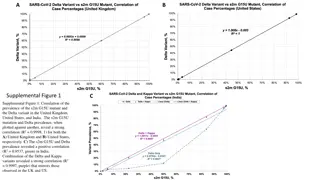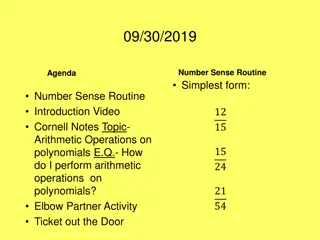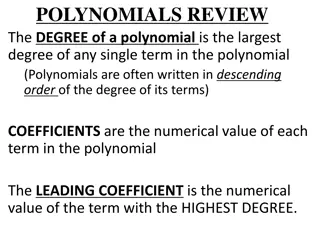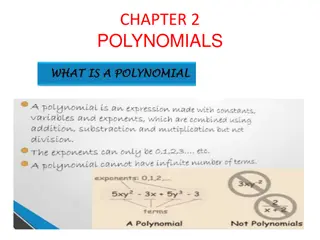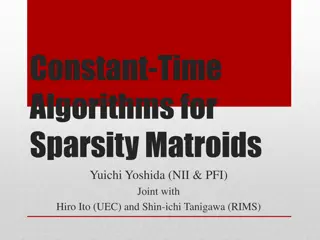Twist Polynomials of Delta- Matroids
Delta-Matroids, generalizations of graphs, offer intriguing connections in ribbon graph theory. Explore examples, fundamental operations, ribbon-graphic Delta-Matroids, and consequences of twist monomials in this comprehensive study.
Download Presentation

Please find below an Image/Link to download the presentation.
The content on the website is provided AS IS for your information and personal use only. It may not be sold, licensed, or shared on other websites without obtaining consent from the author.If you encounter any issues during the download, it is possible that the publisher has removed the file from their server.
You are allowed to download the files provided on this website for personal or commercial use, subject to the condition that they are used lawfully. All files are the property of their respective owners.
The content on the website is provided AS IS for your information and personal use only. It may not be sold, licensed, or shared on other websites without obtaining consent from the author.
E N D
Presentation Transcript
Twist Polynomials of Delta- Matroids By: Lozinskiy Leon, Yuschak Daniel
Why Delta-Matroids? Matroids are often thought of as generalizations of graphs. Replacing the matroid axioms with the more general symmetric exchange axiom, gives rise to interesting connections in ribbon graph theory. They can be found hidden in the following: Column spaces, Skew-Symmetric Matrices, Adjacency Matrix, Graphs in Surfaces, Eulerian Circuits, Grafts, Matchings, and the Greedy Algorithm.
Consequences of Having a Twist Monomial Assume D is a normal delta-matroid and that w(D) = w(D*e) = m Suppose {e} D D*e min size in D*e = 0, max size in D*e = m For any F D of size m, e F Conclusion: {e} D F Dmaxe F
Consequences of Having a Twist Monomial Assume D is a normal delta-matroid and that w(D) = w(D*e) = m Suppose {e} D D*e, {e} D*e min size in D*e = 1, max size in D*e = m+1 There is some F D s.t. |F| = m and e F Conclusion: {e} D F Dmaxe F
Other Consequences (Yan and Jin) By also considering D*{e, f} and using some implications of SEA, it follows that {e} D, {f} D {e, f} D {e} D, {f} D {e, f} D
Constructing the Looped Simple Graph of a Binary Delta-Matroid {e} D {e} D Label the vertices with elements of E A vertex e is looped iff {e} D INCORRECT: Two vertices e, f are connected with an edge iff {e, f} D {e, f} D {e, f} D CORRECT: When at least one of e, f is unlooped: e, f are connected with an edge iff {e, f} D When both of e, f are looped: e, f are connected with an edge iff {e, f} D {e, f} D {e, f} D
Example The binary delta-matroid { , {e}, {f}, {e, f}, {e, g}, {e, h}, {g, h}, {e, f, g}, {e, f, h}, {e, g, h}, {f, g, h}, {e, f, g, h}} has the following looped simple graph
Consequences for Looped Simple Graphs {e} D, {f} D {e, f} D e is a looped vertex f is an unlooped vertex e and f aren t joined by an edge {e} D, {f} D {e, f} D e and f are looped vertices e and f aren t joined by an edge So, any looped vertex isn t connected to any other vertices
One More Consequence of Having a Twist Monomial {e}, {f}, {g} D {f, g} D {e, f}, {e, g} D
Consequences for Looped Simple Graphs So, the looped simple graph of a binary delta-matroid with a twist monomial must be a disjoint union of single loops and unlooped complete graphs Yan and Jin also show that each of the complete graphs must have an odd number of vertices, and that this precisely characterizes binary delta-matroids with twist monomials
What about nonbinary delta-matroids with twist monomials? There are none
Banned Restrictions of Monomial Delta-Matroids {e} D, {f} D {e, f} D Equivalently, D \ ({e, f}c) { , {e}, {f}} D \ ({e, f}c) is called the restriction of D to {e, f} So if D is normal and has a twist monomial, then { , {e}, {f}} isn t a restriction of D
Excluded Minor Theorem for Binary Delta-Matroids (Bouchet and Duchamp) A delta-matroid is binary if and only if no minor of it is isomorphic to any of the following 5 delta-matroids: E = {1, 2, 3} { , {1, 2}, {1, 3}, {2, 3}, {1, 2, 3}} { , {1}, {2}, {3}, {1, 2}, {1, 3}, {2, 3}} { , {2}, {3], {1, 2}, {1, 3}, {1, 2, 3}} E = {1, 2, 3, 4} { , {1, 2}, {1, 3}, {1, 4}, {2, 3}, {2, 4}, {3, 4}} { , {1, 2}, {1, 4}, {2, 3}, {3, 4}, {1, 2, 3, 4}}
Lemma Relating Restrictions and Minors Suppose M and D are normal delta-matroids, and that M is a minor of D Then M is a restriction of some normal twist of D
Banned Minors of Monomial Delta-Matroids No restriction of D is isomorphic to { , {e}, {f}} D is normal and has a twist monomial No restriction of any normal twist of D is isomorphic to { , {e}, {f}} D is normal and has a twist monomial No minor of D is isomorphic to { , {e}, {f}} D is normal and has a twist monomial
If-Then Conditions That Become Excluded Minor Conditions No minor of D is isomorphic to { , {e}, {e, f}} {e} D, {f} D {e, f} D No minor of D is isomorphic to { , {e}, {f}} {e} D, {f} D {e, f} D {e}, {f}, {g} D {e, f}, {e, g} D No minor of D is isomorphic to { , {e, f}, {e, g}} {f, g} D
Using the Excluded Minor Theorem for Binary Delta- Matroids Excluding these minors implies that all 5 of the below delta-matroids also cannot be minors of D E = {1, 2, 3} { , {1, 2}, {1, 3}, {2, 3}, {1, 2, 3}} { , {1}, {2}, {3}, {1, 2}, {1, 3}, {2, 3}} { , {2}, {3], {1, 2}, {1, 3}, {1, 2, 3}} E = {1, 2, 3, 4} { , {1, 2}, {1, 3}, {1, 4}, {2, 3}, {2, 4}, {3, 4}} { , {1, 2}, {1, 4}, {2, 3}, {3, 4}, {1, 2, 3, 4}} And so D must be binary
References I. Moffatt, Delta-matroids for graph theorists, Surveys in combinatorics 2019, 167 220, London Math. Soc. Lecture Note Ser., 446, Cambridge Univ. Press, Cambridge, 2019. Q. Yan and X. Jin, Twist polynomials of delta-matroids, Adv. in Appl. Math. 139 (2022) 102363. Q. Yan and X. Jin, Twist monomials of binary delta-matroids, Preprint arXiv:2205.03487v1 [math.CO]. A. Bouchet and A. Duchamp, Representability of -matroids over GF(2), Linear Algebra Appl. 146 (1991), 67 78.










